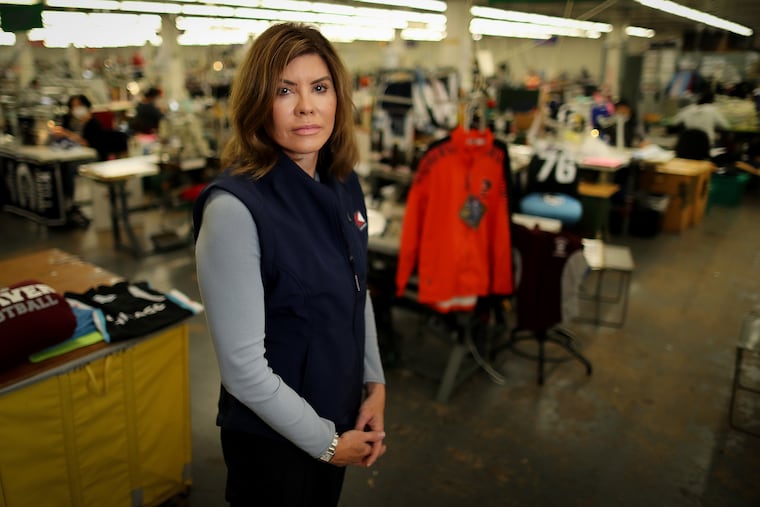A Philly sports clothing firm picks its first female CEO and tasks her with ‘making people aware that we exist’
Boathouse Sports, the athletic apparel firm that makes outerwear for sports teams, hired a new CEO. The firm is a throwback to the city’s all-but vanished past as a major clothing center.

One of the city’s lesser-known enterprises is a factory at the edge of Feltonville and Juniata Park in North Philadelphia, where the whir and clatter of 350 sewing machines and the snap and billow of fabric have helped dress 500,000 U.S. sports teams in the last three decades.
“It’s just a very interesting, authentic heritage,” said Cindy DiPietrantonio, who was hired during the coronavirus pandemic to take the wraps off Boathouse Sports and raise its public profile.
Formerly the chief operating officer of Sidney Kimmel’s clothing company, Jones Group — now Nine West Holdings — and then president of the jewelry company Alex and Ani, DiPietrantonio was recently named the company’s second chief executive.
The Mount Laurel resident is also the first female chief executive since Boathouse Sports was founded in 1985 by John Strotbeck, an American rower in the 1984 and 1988 Olympics. The company quickly became known for its hardy outerwear that stood up to rigorous use from competitive crew teams.
Boathouse today is a throwback to the city’s all-but-vanished past as a major clothing center. “We do all the sewing and cutting,” DiPietrantonio said. “It’s handcrafted right here in Philadelphia.”
Over the next three to five years, she said, the company has a goal to grow business by 500%, despite fierce competition from such firms as Adidas, Nike, Under Armour, Athleta and Lululemon.
"We really strive to be that elite, functional apparel that really improves the journey of the athlete,” DiPietrantonio said. Its biggest customers include Ivy League schools, universities in the Big Ten, and prep schools, in addition to some professional sports leagues.
Boathouse, which hires many of its garment makers from Philadelphia and neighboring communities, is among a growing number of companies such as ABLE and Patagonia, which pride themselves on environmental sustainability, equitable wages, domestic production, and transparency in their manufacturing processes.
“It’s throwing me back all the way back to the ’80s, when [her former employer] Jones domestically made products," DiPietrantonio said, but Boathouse’s manufacturing in the U.S. has meant that their apparel is more expensive compared with clothes produced overseas.
Boathouse, which relies on the craftsmanship of its products to attract customers, has long been a stranger to promoting itself, she said, even as sales in the multi-billion dollar international sportswear industry have surged for years and are expected to hit $208 billion in 2025, according to the German market and consumer data-collecting firm Statista.
Over time, as sportswear giants continued to provide apparel for college and other elite sports teams, Strotbeck said, Boathouse needed to change course.
The company, which has a 100,000-square-foot factory, had since decided to cater to individual customers who wanted to buy just one — or a few — products instead of buying in bulk for a team.
That goal became more important during the coronavirus pandemic, which prompted droves of sports teams to cancel or downsize games and practices.
“We had planned on really moving the company to a broader audience and branding," said Strotbeck, 63, of Ambler, adding that DiPietrantonio would help manage day-to-day operations. “And when COVID hit" — upending much of the global sportswear industry, which in 2019 earned about $181 billion, according to Statista — "it changed everything.”
Like Adidas, Nike, and Under Armour, Boathouse has clothed the elite athlete world, from rowers at the 2016 Olympic Games in Rio de Janeiro to prominent coaches. Andy Reid, who coached the Philadelphia Eagles from 1999 to 2012 before becoming the head coach for the Kansas City Chiefs, paces the sidelines wearing his Boathouse jacket.
But unlike those major companies, Boathouse, which DiPietrantonio said has 150 to 250 employees, has lacked “social currency.”
By the time Strotbeck hired DiPietrantonio during the summer, her task was clear, he said: “We need help with making people aware that we exist.”
Part of that effort will include improving branding on its apparel, enlarging the company’s logo on clothing, and bolstering its online presence, DiPietrantonio said.
Before DiPietrantonio’s arrival, the company attracted attention when it pivoted to replenish personal protective equipment at the beginning of the pandemic.
Boathouse made 75,000 masks for Wawa workers, DiPietrantonio said, and repurposed material from hospitals by sewing them into masks. Boathouse’s staff quickly churned out as many as 150,000 masks for doctors and nurses, and also worked with the Federal Emergency Management Agency to make surgical gowns.
“We got into the PPE business in order to survive," Strotbeck said, saying only that Boathouse’s annual revenues are in the eight figures.
DiPietrantonio sees significant growth potential.
“People still have their jackets because of the quality," she said. “What I’m really bringing is to really take this brand to new heights. There’s so much here already, and it’s really driving that mission.”